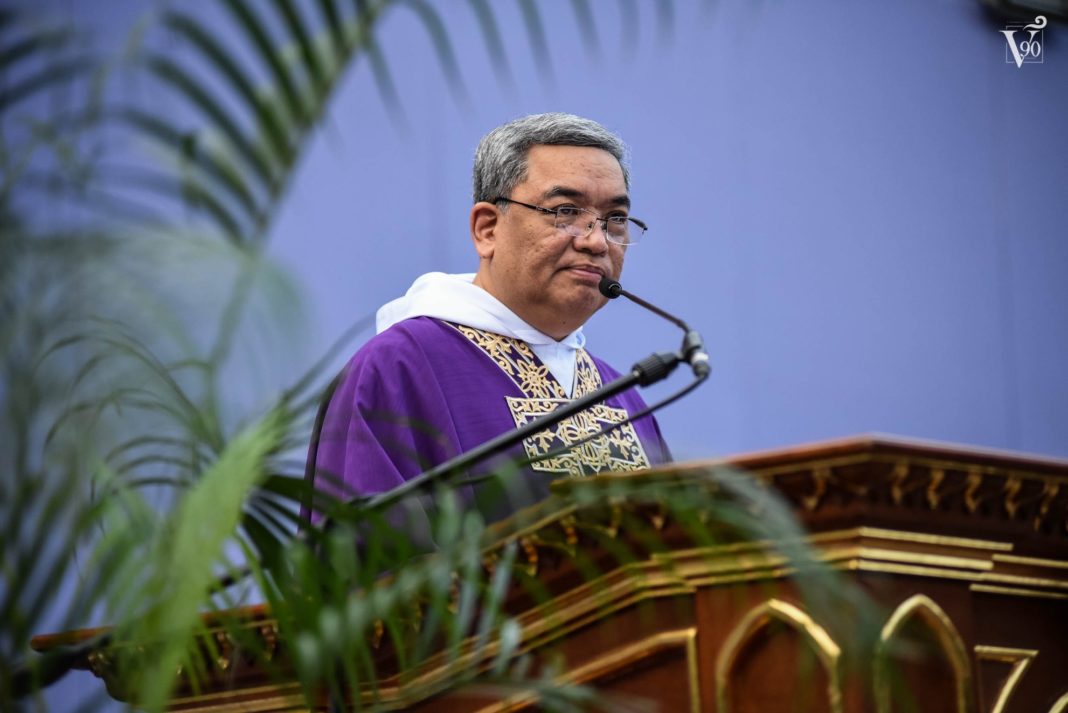RECTOR Fr. Herminio Dagohoy, O.P said the University plans to regularize workers hired on a contractual basis through manpower agencies, to comply with the Department of Labor and Employment’s (DOLE) order restricting contractual employment schemes.
“We are in the process of transitioning, meaning we are regularizing [members of the non-teaching staff] who have been under fixed-term employment,” Dagohoy told the Varsitarian.
“We are being checked by DOLE so if we are not compliant, we would know,” he added.
President Rodrigo Duterte approved in March Department Order (DO) 174 or the DOLE’s new regulation on contractualization, which bans “endo” or end-of-contract and other “labor-only” contracting practices.
Contractualization is a hiring practice covering a short period of employment, usually less than six months.
This practice allows employers to skirt labor laws that require regularization, which involves benefits like paid leaves, healthcare and pensions, at the company’s expense.
Section 5 of DO 174 prohibits labor-only contracting, where the contractor or subcontractor has no substantial capital, investment and control over the performance of workers.
Overtime pay
Dagohoy said plans to regularize maintenance staff began even before the DOLE order.
“There will be strict compliance and conditions and there are existing validations which would not renew the workers’ contracts with their agency,” he said.
Edwin Buhay, a housekeeping supervisor under City Service Corp., said he and his co-workers do not have overtime pay because they are not regular employees of UST.
“Mas malaki `yung benefits na makukuha namin kung magiging regular [kami]. Mas babasehan na rin nila `yung bayad sa off-service,” Buhay told the Varsitarian.
Buhay said City Service provides benefits such as Social Security System and Pag-IBIG contributions.
But they all get equal pay from the agency, even if some have worked for a longer time in the University.
Nagkaisa Coalition spokesman Rene Magtubo said members of the non-teaching staff deserve better work arrangements for hard work in maintaining facilities that directly affect the quality of education.
“A janitor’s work may not be related to the principal business of [UST] but before you provide education, you have facilities to maintain. When a job is usually necessary or directly related to the business, it should not be contracted out,” Magtubo said.
But for UST Security Chief Joseph Badinas, agency hiring helps in ensuring continuity of service, especially when some guards go on sick leave.
Carlos Manapat, economics professor at the Faculty of Arts and Letters, said the University, like business entities, had opted to outsource non-teaching staff to minimize costs.
“UST practices agency hiring to do away with benefits and lessen the costs because janitorial services are not front-liners and are not directly related [to the business of the school],” Manapat said in an interview.
The University takes in workers from SCI Security & Investigation Inc. (SCI) for security services, City Service Corp. for janitorial services and Serman Workforce Service for housekeeping.
There are 130 security guards from SCI and 153 workers from City Service.
The Philippine Statistics Authority Integrated Survey on Labor and Employment in 2014 recorded 1.336 million non-regular workers, of which 672,729 were contractual or project-based workers.
‘Labor policies problematic’
Contractual employment, such as agency hiring, could limit the basic rights of workers, Magtubo said.
“The practice in agency hiring is that if their contract ends, the worker would be removed… which defeats the exercise of their basic rights,” Magtubo said.
DO 174 only regulated contractual employment, he said. Section 11 of DO 174 states the guidelines for contracts between employees and subcontractor or contractor and the service agreement between the contractor and principal employer.
Magtubo said House Bill 6908, “An Act Amending Presidential Decree 442 or the Labor Code of the Philippines,” should be signed to law.
The bill, filed in December 2017, seeks to require licenses for job contractors and benefits for employees. It proposes penalties for labor-only contracting such as a maximum fine of P5 million and non-renewal of a contractors’ license.
The House of Representatives approved the bill on the third and final reading last Jan. 29.
The bill’s counterparts, Senate Bill (SB) 1116 or “End of Endo or Contractualization Act of 2016” and SB 1061 or “Eradicating Abusive Contractualization,” are still pending approval in the Senate.
‘Labor over capital’
Manila Auxiliary Bishop Broderick Pabillo called for humane working conditions, as mentioned in Catholic social teachings.
“Laborers must have priority over capital. They should be compensated properly for their work. As much as possible they should have regular tenure in their work so that they can support their family,” Pabillo told the Varsitarian.
Modern Church teachings on labor began with the landmark encyclical of Pope Leo XIII, titled Rerum Novarum, which called for a minimum wage.
“Let the working man and the employer make free agreements, and in particular let them agree freely as to the wages; nevertheless, there underlies a dictate of natural justice more imperious and ancient than any bargain between man and man, namely, that wages ought not to be insufficient to support a frugal and well-behaved wage-earner,” it states.
To investigate and expose unspoken issues and anomalies, send confidential news tips to the Special Reports team of the Varsitarian at specialreports.varsitarian@gmail.com or at THE VARSITARIAN office, Rm. 105, Tan Yan Kee Student Center, University of Santo Tomas, España, Manila.


















